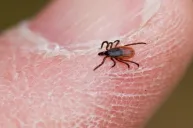The Tick App might just become a common theme in an outdoorsman's routine.
Peak tick season arrives fast, and before you know, those of us who love spending time outside (and who really need to get out there after a long, cold winter) usually have a moment's hesitation.
And for good reason. Tick-borne diseases range from annoying to deadly, from Rocky Mountain spotted fever to Lyme disease.
Researchers at the University of Wisconsin-Madison knew the level of concern, and did their part to help by developing "The Tick App," an online tracking metric that helps identify, and ideally stay away from, the little blood-suckers.
Close to 20-30% of deer ticks can be infected with Borrelia burgdorferi, the disease-causing bacterium, according to Lyric Bartholomay, who studies diseases in ticks and other invertebrates in the Department of Pathobiological Sciences at the UW-Madison School of Veterinary Medicine.
"A lot of the ticks you might encounter could be infected with the bacteria," Bartholomay told Wisconsin Public Radio. "If they feed on you and they stay attached to you for at least 36 hours, they can pass it on just with their saliva as they're stuck to you and blood-feeding."
The Tick App helps identify tick bites, teaches users how to properly remove and dispose of ticks, and even find out if black-legged ticks or deer ticks are particularly active in their area, or the area they're headed.
How's that for knowing what you're getting into when you head outdoors?
A tick that's infected doesn't necessarily stand a higher chance of reaching you and your skin, but The Tick App is free and goes a long way in providing information through an overarching tick exposure study.
The app's daily logs and "Report a tick" feature help folks, specifically those close to known Lyme disease-positive tick colonies, better diagnose themselves after a heightened sense of awareness.
Lyme is the most common vector-borne disease in the United States, according to the CDC, and ticks are encroaching more and more into cities and suburban areas. That means it's not just hikers, campers, and anglers who need to worry.
Most of the users, and therefore the data, are in the Midwest, but the creators of the Tick App hope a more geographically diverse group will download and adopt it.
Ultimately, tick identification and tick activity are vital pieces of info that people like us need. Is there any good reason not to download the app? Because we can't think of one.
You can find The Tick App in the Apple Store for iPhones or Google Play for Androids.
NEXT: WHAT'S IN IT FOR THE REST? A GUIDE TO THE GREAT THINGS ABOUT HUNTING FOR THOSE WHO DON'T DO IT
WATCH




